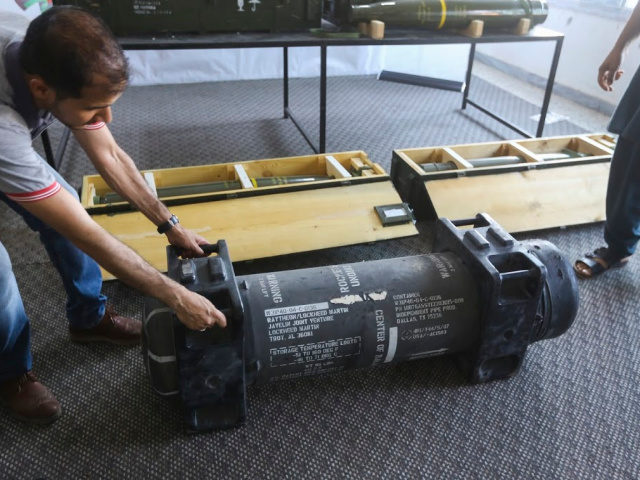France admitted on Wednesday that U.S.-made missiles found on a base operated by forces loyal to Gen. Khalifa Haftar belonged to the French military, but it denied breaching a United Nations arms embargo, claiming that the weapons were “unusable” and never intended to end up with the warlord’s troops, who have been accused of war crimes.
France’s Defense Ministry revelation is an embarrassing admission that has triggered new questions about its role in the ongoing war in Libya.
On Wednesday, the Defense Ministry issued a statement saying four U.S.-made Javelin missiles found in June at a pro-Haftar camp south of the Libyan capital of Tripoli had been purchased by France, without explaining how the arms got there.
Paris argued that the missiles did not violate a U.N. arms embargo because they were originally intended to protect French forces combating jihadis in Libya, home to terrorist groups like al-Qaeda and the Islamic State (ISIS/ISIL).
“These weapons were for the protection of forces undertaking intelligence and counter-terror missions,” the Defense Ministry statement said, according to BBC.
The French Defense Ministry further justified the presence of its missiles in Libya, claiming, “Damaged and out-of-use, these weapons were being temporarily stocked in a warehouse ahead of their destruction. They were not transferred to local forces,” the Agence France-Presse (AFP) news agency reports.
If France transferred the weapons to Haftar, it would also violate the sales agreement with the United States, the New York Times indicated when it reported on June 28 that forces with the U.N.-brokered Government of National Accord (GNA) had discovered the missiles.
U.S. President Donald Trump’s administration has reportedly launched an investigation into how Haftar obtained the missiles.
“We take all allegations of misuse of U.S. origin defense articles very seriously,” an unnamed State Department official said in a statement published by the Times, stressing that the United States backs the GNA. “We are aware of these reports and are seeking additional information. We expect all recipients of U.S. origin defense equipment to abide by their end-use obligations.”
France has joined Russia, Egypt, Saudi Arabia, and the United Arab Emirates (UAE) in lending assistance to Hafter and his Libyan National Army (LNA). The LNA is fighting against the GNA on behalf of the breakaway government based in eastern Libya’s Tobruk region.
With foreign support, the LNA has gained control of most of oil-rich Libya.
Turkey and Qatar are supporting the GNA. Barring France, most Western countries back the U.N.-brokered government. The U.N., the United States, and the European Union have urged Haftar to stop his latest offensive, launched in April to take Tripoli from the internationally-recognized government and engage in peace negotiations, to no avail.
In April, France, which owns oil assets in Libya, reportedly attempted to sideline an E.U. statement calling on Haftar to halt his eastern army’s offensive to take Tripoli, in part, over concerns about the safety of civilians.
The LNA’s offensive to take Tripoli from the GNA has already killed 1,048 people and injured 5,558 others since it began in April, according to the World Health Organization (WHO).
France claims it is not providing weapons to Haftar, arguing that it is only offering diplomatic support.
BBC notes, “France has technically taken a mediation role in the conflict. However, there are suspicions they back Gen Haftar.”
Referring to the discovered weapons in late June, the Times noted:
The four Javelin anti-tank missiles, which cost more than $170,000 each, had ended up bolstering the arsenal of Gen. Khalifa Hifter, whose forces are waging a military campaign to take over Libya and overthrow a government the United States supports.
The GNA discovered the missiles when it overran the pro-Haftar base in Gharyan, located about 60 miles south of Tripoli.
Haftar’s foreign supporters believe the warlord can bring stability to Libya and defeat the jihadi groups that have taken root in the North African country, which has descended into chaos since the U.S.-backed overthrow of dictator Muammar Gaddafi in 2011.
Human rights groups have accused the LNA of war crimes against civilians.

COMMENTS
Please let us know if you're having issues with commenting.